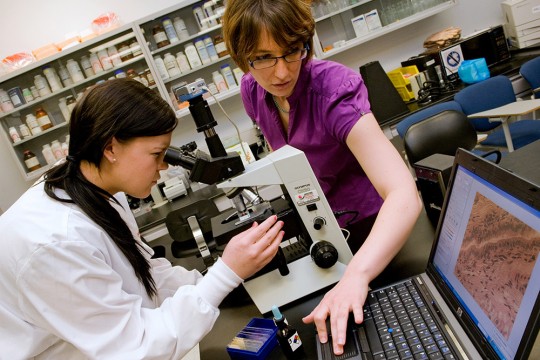News
Mechanical Engineering MS
-
December 13, 2021
![cells sitting on top of a carbon nanotube.]()
RIT and UR professors awarded patent for use of carbon nanotubes for improving delivery of bio-therapies to targeted cells
RIT Associate Professor Michael Schrlau and Ian Dickerson from the University of Rochester Medical Center have received a patent to deliver biomolecules into cells through carbon nanotube arrays.
-
November 18, 2021
![side-by-side portraits of Kathy Yu and Nick Schneider.]()
RIT names new members to its board of trustees
RIT appointed two new members — who are also alumni — to its board of trustees. Kathy Yu ’91 has more than 20 years of experience in the technology and semiconductor manufacturing sectors. Nick Schneider ’10, ’10 MS is a principal at Boston Consulting Group, where he is a lead in the company’s technology, media, and telco sector.
-
October 8, 2021
![researcher looks into microscope while professor adjusts display on laptop.]()
Faculty compensation is focus of NSF-sponsored research
To build understanding of faculty compensation systems and improve conversations around salary, several RIT faculty members are sharing their experiences with a National Science Foundation-funded multidisciplinary research team. The team’s goal is to significantly expand knowledge of best practices for faculty compensation to a broader community in higher education and provide insights to guide compensation practices.
-
August 30, 2021
![researchers looking at a laptop on a table with beakers and vials.]()
Engineering faculty member receives NIH grant to develop biotechnology to better detect sepsis
As one of the leading causes of death in hospitals, sepsis becomes more complicated with the rise in bacteria most resistant to some of today’s antibiotics. If physicians can detect onset earlier, treatments could begin sooner. Ke Du, a mechanical engineering faculty-researcher, will be developing a microfluidic device to improve detection of drug resistant bacteria in blood.
-
May 8, 2020
![Manuela Campanelli, Satish Kandlikar, and James Perkins]()
RIT Honors Distinguished Faculty Awardees for 2020
RIT honored its 2020 class of Distinguished Faculty—Manuela Campanelli, Satish Kandlikar and James Perkins. The Distinguished Professor designation is given to tenured faculty who have shown continued excellence over their careers in teaching, scholarly contributions, lasting contributions in creative and professional work and service to both the university and community.
-
April 15, 2020
![An enlarged image of the different bioparticles found in a specimen.]()
RIT researchers build micro-device to detect bacteria, viruses
Ke Du and Blanca Lapizco-Encinas, both faculty-researchers in RIT’s Kate Gleason College of Engineering, worked with an international team to collaborate on the design of a next-generation miniature lab device that uses magnetic nano-beads to isolate minute bacterial particles that cause diseases. This new technology improves how clinicians isolate drug-resistant strains of bacterial infections and difficult-to-detect micro-particles such as those making up Ebola and coronaviruses.
-
November 25, 2019
![Student works on amusement park ride make of K'nex pieces.]()
How to Get a Theme Park Engineer Job
ASME.org features David Swerzenski '17 (mechanical engineering) and talks to Tim Landschoot, principal lecturer in the Department of Mechanical Engineering, and Catherine Osadciw, fifth-year software engineering major.
-
November 5, 2019
![Machine to measure puffs from cigarettes.]()
Studying the Side Effects of Vaping and E-Cigarettes
The American Society of Mechanical Engineers features Risa Robinson, department head, mechanical engineering.
-
August 27, 2019
![Scientist holds vape-measuring device.]()
RIT lab researching vaping amid recent death
WROC-TV talks to Risa Robinson, department head and professor in the Department of Mechanical Engineering, about her research on vaping and e-cigarettes.
-
August 15, 2019
![logo for RIT intersections: the RIT podcast.]()
Podcast: Electronic Cigarette Research
Intersections: The RIT Podcast, Ep. 21: Are electronic cigarettes really a healthier alternative to tobacco products? Risa Robinson, head of RIT’s Department of Mechanical Engineering, talks with Edward Hensel, associate dean, about their unique research methods into how these devices are used and how they affect users’ health.
-
June 24, 2019
![Two students and a professor work on a computer with infrared imaging of cancerous tumors.]()
Infrared imaging technology being developed to better detect breast cancer
Faculty and student researchers at RIT, and physicians from the Rochester Regional Health System (RRHS), developed a non-invasive process using infrared imaging to better detect cancerous tumors.
-
June 10, 2019
![Four people stand together, with two in center holding glass awards.]()
Saunders College names Optimax president, CEO as 2019 Vanden Brul Award recipients
Michael Mandina, president of Optimax, and Richard Plympton, CEO of Optimax, have been named the 2019 recipients of the Herbert W. Vanden Brul Entrepreneurial Award, presented by Saunders College of Business. The award is given to entrepreneurial leaders in the greater Rochester region who have developed a business that has improved the local or regional economy or whose innovative management skills have changed the course of an existing business.





















